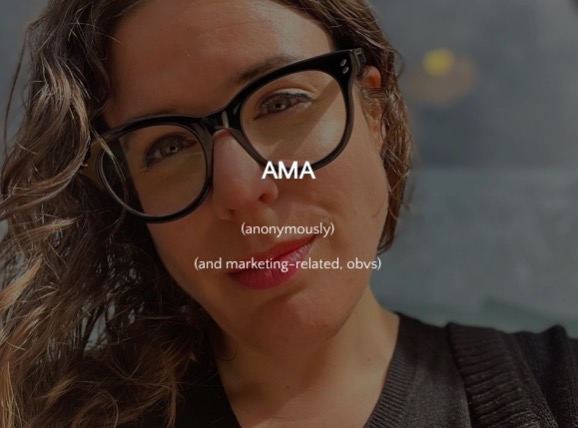(That’s just asking for trouble, isn’t it? Well it’s not if you promise to keep it clean)
A few weeks ago I published a post explaining some basic marketing-related terms (this one) and was overwhelmed with the response I got.
It made me remember that all of us are winging it sometimes, and can find ourselves in situations where we can’t admit that we don’t know something.
Your chance to fill a knowledge gap without revealing who you are
So here’s my offer: if you have a B2B Tech Marketing-related question about
Positioning
Messaging
Content
Strategy
Personas
Value propositions
Copywriting
…or a related topic, you can use this link to ask it anonymously.
I will try to answer it on here. And if I can’t, I’ll try to find someone who can.
(Don’t be put off by the teenie-looking and not very B2B app. It’s not Linkedin, but it’ll do the job).
Can’t wait to hear from you.
(Oh and if you like my content, I’d appreciate a share or a recommendation)
First question is in, and it’s brilliant:
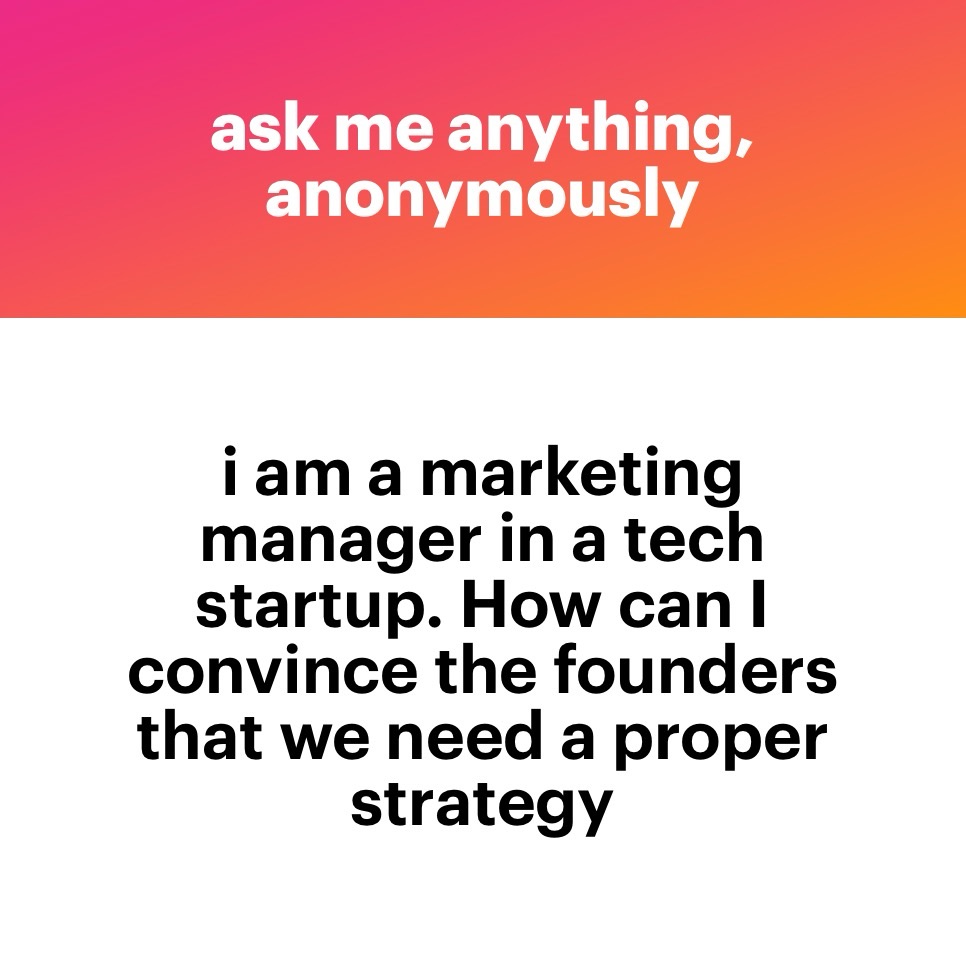
That’s a really tough one. If there was one surefire formula, I’d be rich.
The issue is that startup founders are really hard nuts to crack, for a number of reasons:
- They tend to be super smart themselves, which can make them sceptical of other people’s expertise, especially when, as founders, they’ve had to do a bit of everything – Marketing, Sales, Bookkeeping, HR… It can make them think they are experts at everything
- They know their product like no one else (often because they’ve built it themselves), and don’t trust outsiders to represent it accurately
- If the founder is a techie, scientist, or software engineer, they sometimes don’t fully understand the need for comms. They think their product is brilliant and assume everyone else can see that, too
- In the early stages they’re often involved in Sales themselves. They may have spoken to customers and heard about their pain points. And they’ll have prepared answers for them. But often, when they scale and make that first marketing hire, they forget to share all that useful knowledge with their marketing person. And then don’t understand why other people just don’t get it.
Now I don’t know if any of the above is the case with your founders. But here are some arguments that have worked for me in the past:
1. The people in your target companies who “get the tech” are usually not the same ones who “have the money”. You need a comms specialist to translate the features of your product into benefits for non-techie budget holders
2. We need to get the narrative out of your head and onto a document so we can all be on the same page on what it is we do, who it’s for, and why they should care. If we don’t do this, our story will be inconsistent, and we won’t be able to scale our marketing efforts (eg brief copywriters who can do some of that work for us)
3. You’re biased. (This one works well with scientists). Because you’re so convinced that your product is amazing, you can be blind to the reasons why buyers may be sceptical, the workarounds they’ve learned to live with, and the internal resistance they’re facing. An outsider who understands tech buying processes and audiences, and who has experience poking holes in the story, and asking uncomfortable questions can help us make our story so much stronger.
I’m sure there’s more and I’ll update with other points when I think of them. I hope this has been helpful! (you can drop an anonymous comment to let me know).
Question #2 is about value proposition canvases
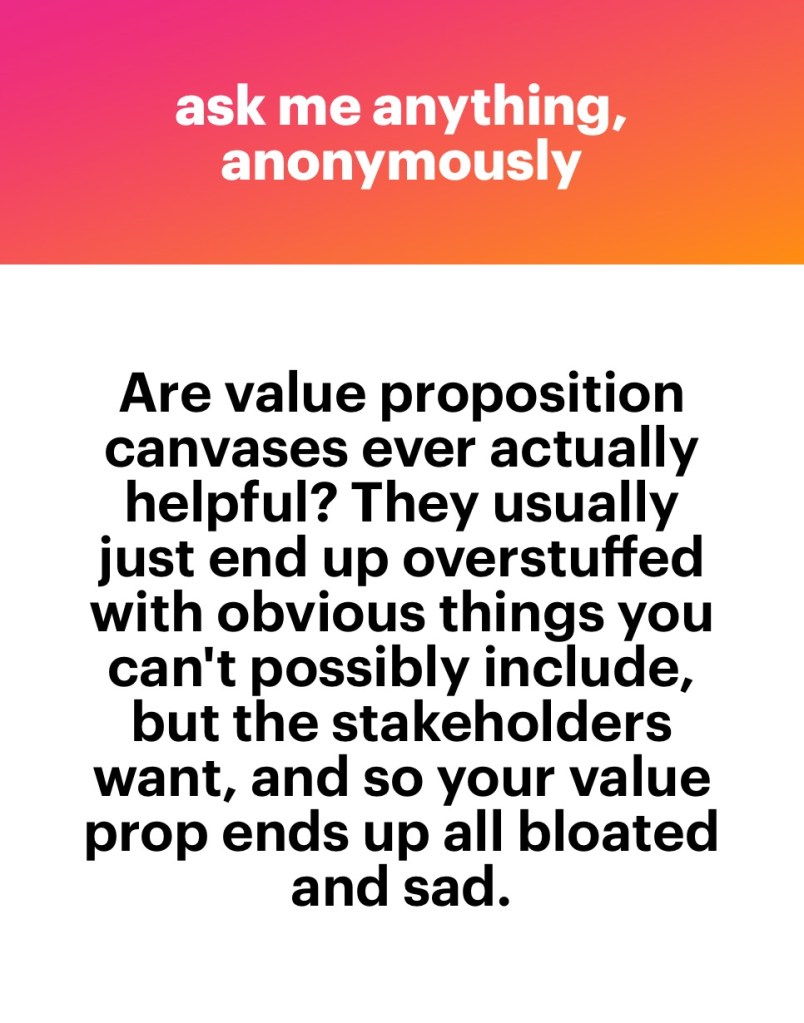
I can hear the frustration in this one. And I share it. To answer it, I’m going to have to make some assumptions:
- I’m assuming you’re talking about canvases like the Strategyzer one
- I’m assuming you’re talking about the absolute state they end up in after a half-day stakeholder workshop, full of bullets and buzzwords and sticky notes
And then my answer is absolutely, no, they’re not useful as value propositions. Except:
There are two purposes to a workshop like that. Only one of them is to arrive at a value proposition. The other is to get all the stakeholders into a room, get them to dedicate some brain space to the key questions every business needs to ask itself, and make them feel that they’ve been asked and have been heard. This is hugely useful. Because it gets them on board with the process and limits them in their ability to undermine your efforts further down the line (at least if they don’t want to look like an absolute tool).
The output from a value proposition workshop is not a value proposition. At least not straight away. It’s a brain dump where you’ve collected – and ideally weighted – the key issues. Now is where the real work starts. In my opinion, good value propositions are not created by committee. The issues need to be ordered, distilled, outliers weeded out, missing information (such as e.g. customer insight) researched and added. Only then do you start copywriting and polishing it.
It also helps to nominate an ultimate decision-maker with whom the buck stops. (Ideally choose someone very senior, decisive and not-too-precious). It’s their job to make the tough calls on points of disagreement, and everybody involved needs to be aware of the importance of this. Because you’re absolutely right: bloated and sad never got no leads excited.
But in summary: if you think as the workshop as at least 40% kum-ba-yah, and of its output as loose materials that give you a starting point, then that messy canvas becomes less frustrating. In my experience, anyway.
I hope my assumptions were right and this was a helpful answer.
Feel free to get in touch again if not.
Question 3 is about turning value props into content
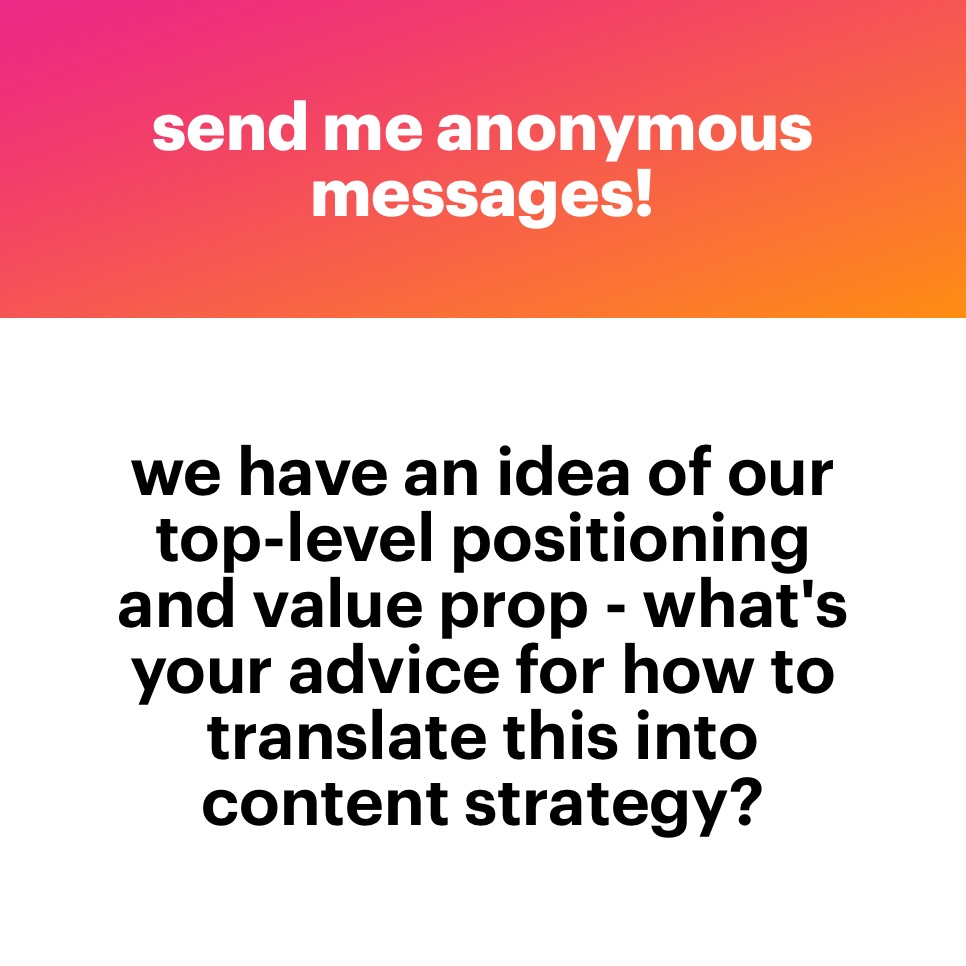
Nice one!
My general advice would be that your best content will always come from the things that you know better than anybody else. The things you could actually teach. And that your prospects will care about. Ideally, once you’ve gone through the process of distilling what that is, that has become an essential part of your value proposition, too.
But it’s a hard one to answer in the abstract. So I’ll use an example. Let’s say you’re in the data center business, and you have a number of data centers in the UK that are equipped with such an amazing low latency network that you can reliably power edge applications. That’s already pretty cool. But say you’ve also developed water cooling technology so that your data centers do all this high-performance stuff without costing additional energy to stop your servers sweating.
Then you have that amazing intersection of
A) Something you know better than anybody else – i.e. more eco-friendly high-performance computing
B) Something your target audience cares about – meeting sustainability goals across their entire business, including in IT operations
And that intersection is where the good content is hidden.
You could now e.g. create content about “net-zero multiplayer gaming” (which combines the edge computing and sustainability themes). Ideally you’d already have a customer in that space that you could showcase, but the beauty of this is that you could even interview the CEO of that gaming company and make them the hero of a blog post or video. Even if you don’t know them. They’re not going to refuse getting to tell their story, and exchanging ideas with a like-minded business. By highlighting their good work, you’re automatically claiming that space, too – without explicitly beating your own drum.
(And then of course you do all the usual content strategy stuff of planning out your hero pieces and different formats, and the channels where your audience hangs out etc).
Thank you for this excellent question!
Question 4 is about the voice of the customer
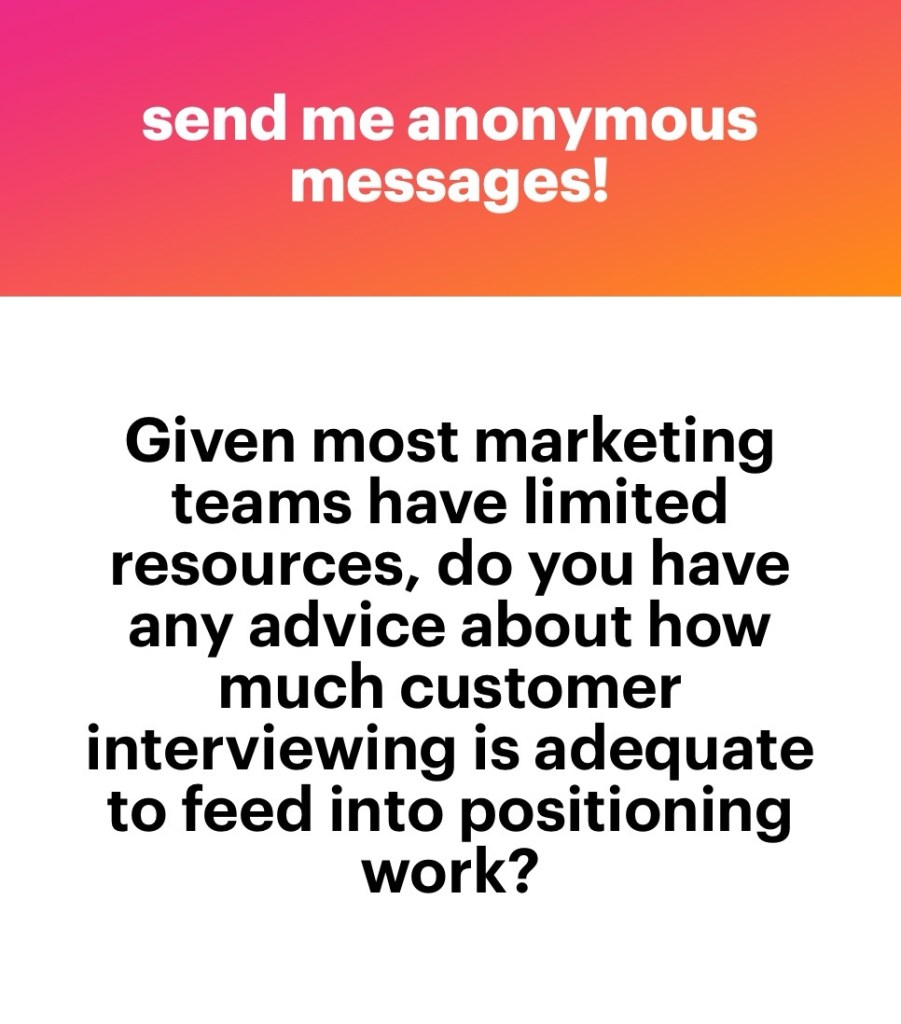
Oh man. Love that somebody asks about this. (You may have seen me post about it on Linkedin the other day). It’s something I keep banging on about. I have worked on a ton of projects where my request to speak to an actual customer was met with blank stares or impatience.
In fact, in my experience it’s not so much the lack of resource that stands in the way of customer insight, but the fact that many marketers don’t understand the importance of it. They’re not always to blame though. In plenty of organisations it’s the salespeople who gatekeep their customers, and they won’t let marketers speak to them. It’s a big problem.
But to answer your question, speak to as many customers as you can for you positioning or value proposition or messaging project, and if you’re in-house, make it a regular ritual to interview customers, especially when things change – eg the market, or your product, or the distribution model, or the competition…
Having said that, there is a point of diminishing returns. For a project I did last year for a services org, I interviewed 10 CIOs of enterprise-sized companies across the world. And while each geography, person and industry reported unique challenges, there was a point around interview #7 where I felt a story emerge, and key elements kept repeating. But this varies from project to project and will also depend on…
- The newness and complexity of your proposition
- The attitudes, maturity and appetite of your customer base
- The number of decision-makers who are typically involved
- how challenging it is to adopt your product…and so much more.
But as a general rule, if you’re a strategist and you’re told you can’t speak to a customer, raise the alarm with the person who hired you for the job.
